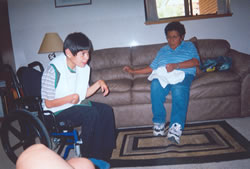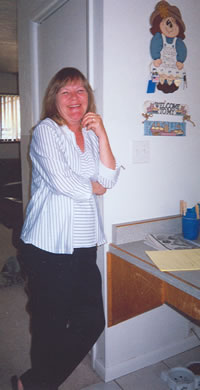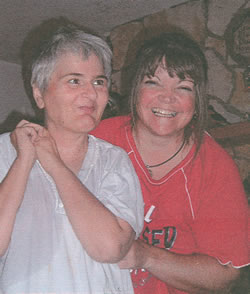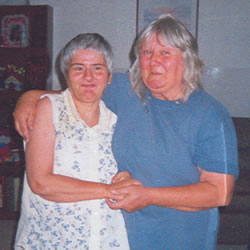
Lisa Cantsee (left) & Helen
Toney,
Direct Support Provider |
Imagine a home where four women live
as roommates in modest comfort. They range in age from
26 to 57; two of them don’t walk, two of them don’t
talk. They are moderate-to-severely, developmentally disabled
and require non-nursing care 24 hours a day, seven days
a week.
These women are your neighbors in Moab, and many people here see them
out and about at grocery stores, the library, the pool and the park.
One participates in Special Olympics, a dynamic culture of other adults
with disabilities who live in Moab make up a community of their own within
the greater Moab Community.
What they all have in common is that they receive services from Rise,
Inc., a non-profit organization that contracts with the state to provide
support programs for people with developmental disabilities. In Moab
Rise serves four women in its Residential Program and 11 people in what
is called Supported Living. The latter is a program offering assistance
with shopping, housekeeping, banking, transportation and even supported
employment to allow people with lesser, but still severe, disabilities
to live in their own homes. There are over a dozen people in Moab who
work for Rise and provide these services. When they are asked where they
work, and respond, “I work for Rise,” staff is usually met
with an inquisitive bewilderment.

Claudia Shields,
Moab RISE Coordinator |
“People in general don’t
understand what we do here,” comments Moab Coordinator
and Assistant Director Claudia Shields. “I’ve
tried to educate the public, but there is sometimes a misunderstanding
that this is assisted living or a home health service.”
Rise Founder and President Gerald Nebeker
started the company in Provo, Utah in the early 1980s,
and found the demand was so great services have grown to
include an array of programs in four states: Utah, Arizona,
Oregon and Washington.
“We offer such a wide variety of services that try to offer the best quality
of life people can have,” Claudia said. “We help people with independence.”
Before services such as RISE began emerging, people with disabilities
were routinely institutionalized and “told” where to go,
what and when to eat, what to wear, Claudia explained. “Now they
have choices,” she said. “That’s an important part
of what we try to do.”
A lot of the assistance offered in the Residential Program deals with
medical issues, such as assisting people with medications and equipment
for bathing, exercising, even eating. Residential staff keep house and
provide total care for their clients, and the relationships that form
are often strong bonds of love.
“I love everything about them,” says Charlene Brown, a direct care
provider who has worked for RISE’s Residential Program for three years. “They
have a lot of insight into things we don’t because they see it from a different
perspective. And they are really fun to do things with because of their reactions.
They are so easy to please.”
 Alice Walker (left) & Charlene
Brown,
Alice Walker (left) & Charlene
Brown,
Direct Support Provider
|
Charlene regularly took two or more
of “the ladies,” as staff collectively calls
the residential clients, to the car show and other day
fairs in Moab this past summer. RISE, Inc. leases a state-of-the-art
van that enables staff and clients to be mobile.
Another staff member said she didn’t know what gratitude was until
she met the four women she said she feels privileged to know.
“In this environment I have time to give a massage to someone whose physical
pain is probably beyond anything I can imagine,” she said. “And after
a few minutes of such miniscule effort, she’ll look up at me and say, ‘I
love you.’ There really is no greater reward than that, because this lady
wouldn’t say it if she didn’t mean it.”
Supported Living clients enjoy each other’s company as well as
their service providers. They bowl regularly; cook and watch movies together;
participate in Special Olympics activities such as swimming, golf and
bocce; and make an annual trek to Salt Lake City for a three-day Quality
of Life conference the local community helps finance through generous
donations. Special Olympics is also largely funded by local donations,
and countless volunteer hours from some of the very same people who support
their clients for a living.
Claudia said the next logical expansion of RISE services in Moab would
be in the area of assisted living for senior citizens. All programs are
overseen by a host of regulatory agencies, including the State Department
of Public Health, and adhere to high standards of safety, health, home
maintenance and food services. Each direct care provider receives paid
training prior to full employment, and monthly training on specific aspects
of working with adults with disabilities.
More information may be obtained by calling the local RISE office at
259-4127, where volunteer and/or employment opportunities are available,
or Provo’s toll free line at 800-257-9920.
 Alice Walker (left) & Jolyne
Lee,
Alice Walker (left) & Jolyne
Lee,
Direct Care Professional |
|



